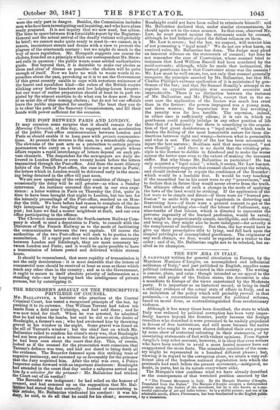THE RECORDER'S ASSAULT ON THE PRESCRIPTIVE PRIVILEGE OF COUNSEL.
Mn. BALiarrnfz, a barrister who practises at the Central Criminal Court, has tested a recognized principle of the bar, by pushing it to its extreme. One William Tarrant had taken ten lambs from a field near Uxbridge, and had sold them ; and he was now tried for theft. When he was arrested, he admitted that he had taken the lambs, but said he did so at the desire of Roadnight, a farmer's son ; who had awakened him by throwing gravel at his window in the night. Some gravel was found on the sill of Tarrant's window ; but the chief fact on which Mr. Ballantine relied to confirm his client's story was, that Roadnight had not been produced as a witness for the prosecution, although he had been seen about the court that day. This, of course, looked as if the counsel for the prosecution were conscious that Tarrant's defence was true, and had not dared to bring forth all the evidence. The Recorder fastened upon this striking trait of negative testimony, and summed up so favourably for the prisoner that the Jury acquitted him. After the trial was over, a Police Inspector came forward with an important disclosure: Roadnight had attended in the court that day under a subpoima served upon bini by a solicitor for the prisoner : Mr. Ballantine had tricked the Court out of its verdict I
The Recorder was indignant : he had relied on the honour of Counsel, and had summed up on the supposition that Mr. Bal- lantine had stated the fact correctly. Instead of succumbing to this rebuke, Mr. Ballantine vindicated his conduct : it was his duty, he said, to do all that he could for his client ; moreover, Roadnight could not have been called to criminate himself: turd Mr. Ballantine declared that, under similar circumstances, he should again act in the same manner. In that case, observed Mr. Law, he must guard against the statements made by counsel, although he had hitherto placed the fullest reliance on them.
Mr. Law is severe; but the bar, we suspect, will convict him of not possessing a "legal mind." We do not see what harm, on received rules, Mr. Ballantine has done. The Judge may plead an innocent reliance on the statements of counsel; but does he not remember the case of Courvoisier, whose counsel tried to insinuate that Lord William Russell had been murdered by the maid-servants; although, while he made that insinuation, the learned gentleman knew that Courvoisier alone was the assassin t Mr. Law must be well aware, too, not only that counsel generally recognize the principle asserted by Mr. Ballantine, but that Mr. Charles Phillips's extreme application of it is maintained by gen- tlemen of the bar; and that Sir Samuel Romilly's attempt to re- cognize an opposite principle was accounted eccentric and impracticable. There is no distinction between the instance of Mr. Ballantine and Mr. Phillips's, except that in the re- cent case the application of the licence was much less cruel than in the former: the person impugned was a young man, not three women ; the imputation was far less revolting ; the penalty was far less terrible. The aspersion, indeed, in either case is sufficiently odious; it is one in which no gentleman could possibly indulge in any other position of life than that of a barrister : but there is something in the acquisi- tion of that great desideratum a "legal mind," which tends to deaden the feeling of the most honourable nature for these dis- tinctions between right and wrong—between what is permissible and what is not. The study of the law has been accounted to injure the best natures ; Benthani said that none escaped, "not even Romilly" ; and there is no doubt that the vitiating prin- ciple is the licence to dabble in falsehood and to make the worse appear the better case even to the extent of making the innocent suffer. But why blame Mr. Ballantine in particular? He has only acquired a "legal mind " ; which, it seems, Mr. Law has not. A contemporary suggests that counsel should accept the rebuke, and should endeavour to regain the confidence of the Recorder : which would be a laudable feat. It would be very touching if the assembled bar in his court were to cry " peccavinms," and to declare that in future they would never swerve from the truth. The ultimate effects of such a change in the mode of applying the laws of the land would be striking. If the application of the law were to be simple and direct—if there were no "learned pro- fession" to unite with rogues and vagabonds in distorting and frustrating laws—if there were a general consent to get at the real truth and nothing else—half the labour of Parliament, nay, nine-tenths of that labour, which is directed to encounter the perverse ingenuity of the learned profession, would be saved; laws might be proportionately simple, intelligible, and efficacious; and being so, they might also be more indulgent—for severity is the complement of inefficiency. But then, the bar would have to give up their prescriptive title to lying, and fall back upon the simpler privileges of accomplished gentlemen. The originator of any such change, we fear, would be regarded as a traitor to the order ; and if so, Mr. Ballantine ought not to be rebuked, but ex- alted as its champion.


























 Previous page
Previous page